The Building Research Institute (BRI) conducted an 8-week training course on environmental technologies for building and housing every year from 2009 to 2011 in cooperation with the Japan International Cooperation Agency (JICA). The outline of this training course was as follows. |
Objective
The population in Asia and Oceania accounts for 60% of the world total population in 2010, while the CO2 emission from that area accounts for 45% of the world total. The discrepancy between those figures means a huge potential of increase in energy use and CO2 emission in Asia and Oceania area. |
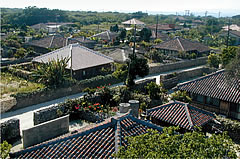 |
Building and housing accounts for large portion of the total energy use and CO2 emission with industry and transportation as other major causes. The efficient and wiser use of energy is beneficial not only for mitigation of global warming, but also for some other reasons such as reduction of local air pollution, improved health, quality of life, energy security, etc.
This training course was designed for government officials from developing countries in Asia and Oceania to acquire the building technologies of energy saving and CO2 reduction, so that they could develop regulations and design guidelines for environmental-friendly building and housing to be disseminated in their countries
Training Period
8 weeks (e.g. August 21 to October 15, 2011) |
Contents of the Training Course
This training course consisted of lectures, exercises and technical visits.
The lectures included the following subjects/agendas. |
- Outline of Low Energy Housing with Validated Effectiveness (LEHVE)
- Passive Solar,Room Heating,Heat from the Interior
- Air Conditioning Systems and its Energy Conservation
- Energy-efficient Equipment Technology
- Cooling System Planning
- Hot Water System Planning
- Lighting System Planning
- Energy conservation on Home Electronics
- Heat Control Technology of Building Envelope - Insulated Building Envelope Planning
- Application of Highly Reflective Coating Systems for Roofing
- Passive Cooling Design in hot-humid climate regions
- Introduction of Solar Power Generation (photovoltaic) into House
- Solar Water Heater and Hot-water Supply
- Performance Improvement of Indoor Air Quality and Energy Conservation by Employing Mechanical Whole House Ventilation
- Ultra Water-saving Technology Development for Building and Housing
- Development of the LCCM (Life Cycle Carbon Minus) Housing
- Examples of Environmental-friendly Housing Projects
- Global Environment Problems and Sustainable Buildings
- Social System for Private Houses and Buildings in views of Health and Energy Savings
- Energy Use and Green House Gas Mitigation Strategies for Residential Buildings Southeast Asia Countries
- House-Building Industry in Japan and its Building Systems
- Meteorological Databases and Analysis Techniques
- Project Cycle Management
|
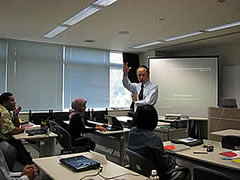
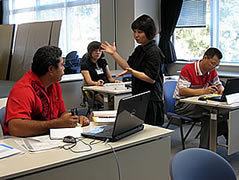
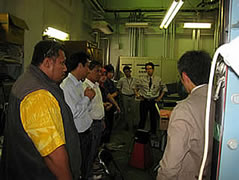
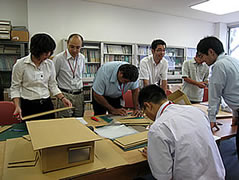
|
|
The technical visits were held in Tokyo or its suburban areas (towns, construction sites and factories) and in the Okinawa Islands, which had examples of well designed buildings for energy saving and comfortable indoor environment in hot and humid climate. |
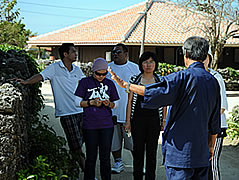 |
By the end of this training course, trainees were expected to make their action plan describing what they would do in their on-going activities after they went back to their home countries with putting the knowledge and ideas acquired and discussed in Japan among others. |
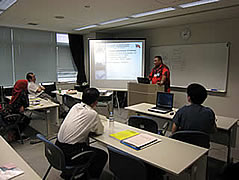 |
|
Contact Information
Coordinator for International Research Cooperation, BRI
bri@kenken.go.jp |